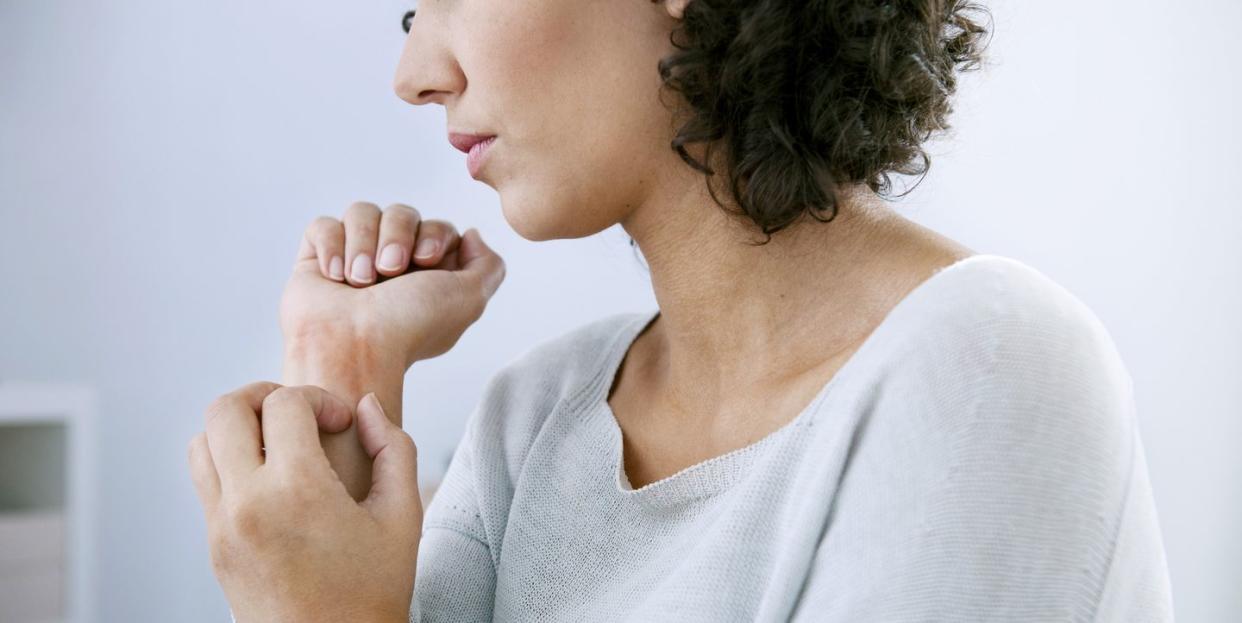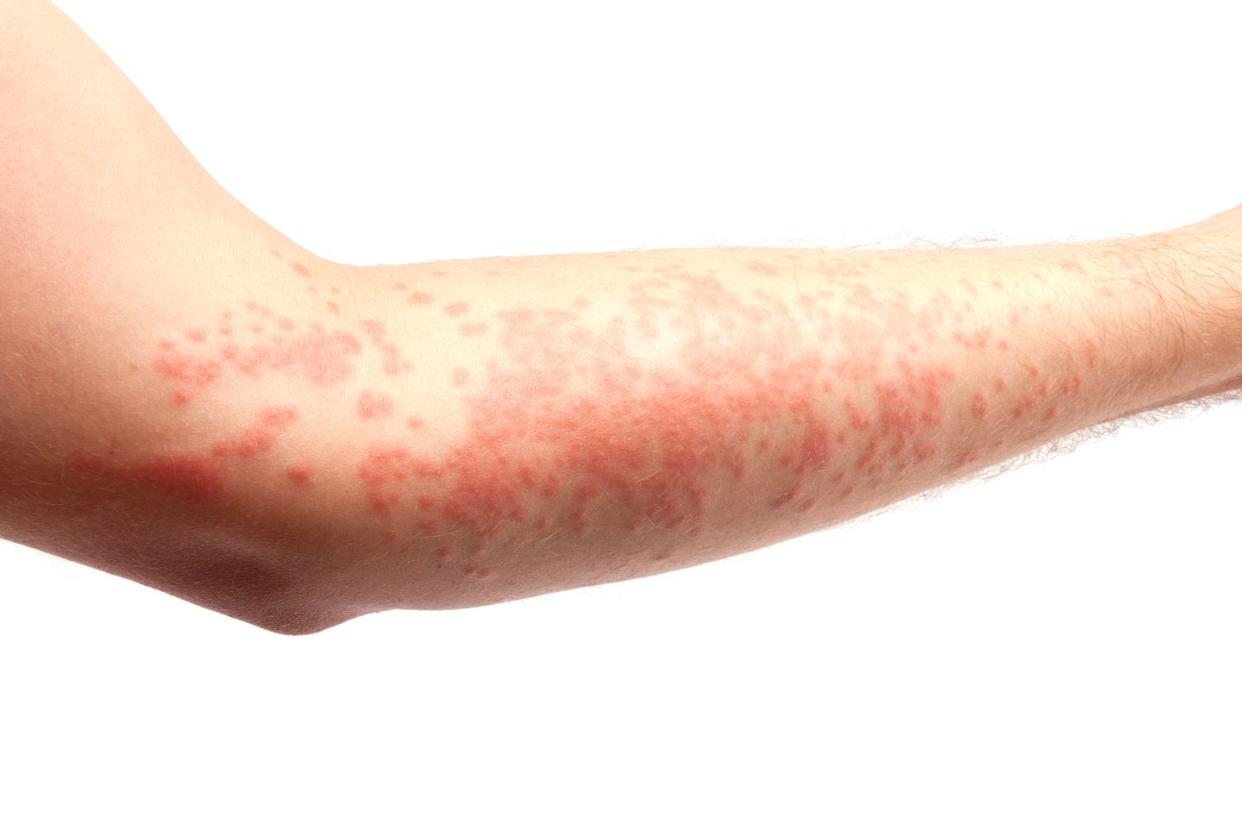Dermatologists Say This Is How You Get Rid of Hives Fast

"Hearst Magazines and Yahoo may earn commission or revenue on some items through these links."
If you’ve developed a rash that’s hot, swollen, bumpy, or itchy, it’s possible you have hives. Finding hives on your skin can be unsettling, and usually you can’t be sure where they came from. No matter what caused the irritation, we know that you want to find relief fast. So, if you’re asking yourself how to get rid of your hives, you’ve come to the right place.
Hives are a skin reaction that occur when cells in our blood stream called mast cells release histamine, says Mona Gohara, M.D., board-certified dermatologist, an associate clinical professor of dermatology at Yale University, and member of Prevention’s Medical Review Board. “Mast cells are triggered to release histamine by a whole host of things including medications, infections, and allergens.”
Want to get rid of your hives ASAP? Here, expert dermatologists weigh in on natural remedies you can do at home, over-the-counter (OTC) options, and when to see a doctor about your irritated, inflamed skin.
What do hives look like?

Hives, also called urticaria, appear as red to pink areas of superficial swelling in the skin, says Blair Murphy-Rose, M.D., board-certified dermatologist at Laser & Skin Surgery Center of New York. These swollen areas or welts can be small or large, she says. “Any one hive lasts less than 24 hours by definition, but the episodes can recur for days or weeks. Acute urticaria is defined as episodes lasting up to 6 weeks.”
What causes hives?
Hives can be triggered by a wide variety of causes, including both allergic and non-allergic causes, says Dr. Rose. “The most common allergic triggers of [hives] include medication and food allergies.” Common medications triggering hives include aspirin, NSAIDs, opiates, many antibiotics, sulfonylureas, angiotensin-converting enzyme (ACE) inhibitors, and iodine.
If you develop hives after eating meat, you might consider getting tested for alpha-gal syndrome, adds Dr. Rose, which can be caused by certain tick species like amblyomma, the lone star tick. Bed bug reactions can also look like hives, says Dr. Rose. “Particularly suspicious are hive-like bumps in groups of three.”
Still, sometimes your hives are not a result of any allergy or tick-borne syndrome. “Some people may also develop hives due to pressure on the skin, hot or cold temperatures, and physical exercise,” says Dustin Portela, D.O., board-certified dermatologist and dermatologic surgeon of Treasure Valley Dermatology.
Hives can be accompanied by tongue swelling and shortness of breath, and in this case are obviously considered an emergent matter, notes Dr. Gohara, and you should seek emergency medical care.
How to get rid of hives
The best way to treat hives is to prevent them from developing to begin with, says Joshua Zeichner, M.D., associate professor of dermatology and the director of Cosmetic & Clinical Research in Dermatology at Mount Sinai Hospital in New York City. “Avoid processed or canned foods and stick to fresh options.” Aspirin is also a known trigger, so you should use an alternative pain reliever if you are prone to developing hives, adds Dr. Zeichner.
Natural remedies for hives
If you feel hesitant to go straight to OTC treatment options, here are some remedies that you can try from the comfort of your home, according to Peterson Pierre, M.D., dermatologist and founder of Pierre Skin Care Institute.
Use a cold compress
Draw yourself an oatmeal bath
Apply witch hazel or aloe vera to the irritated area
Stay cool, “as heat tends to make the itch worse.”
Dr. Zeichner adds that you should make sure to keep the skin barrier hydrated and intact, especially if you are scratching your skin. “Eucerin Advanced Repair Lotion is ultra lightweight and can be spread over large surface areas without leaving the skin feeling greasy.” The lotion also contains ceramides which help repair the skin barrier and pull in hydration, he adds.
OTC remedies for hives
If you suffer from seasonal allergies, antihistamines can be taken on a daily basis to prevent hives from developing, says Dr. Zeichner. “Allegra Hives is an FDA cleared option to consider.”
Antihistamines reduce the amount of histamine circulating in your body to decrease symptoms, says Dr. Rose. “Diphenhydramine (Benadryl) is one of the best OTC treatments for hives. It has a quick onset so it works fast, but can cause sedation and fatigue, so it is best to take it before bedtime or a nap.” Note: some people, especially older individuals, have an opposite response to Benadryl and it keeps them awake, warns Dr. Rose.
Some of the newer generation antihistamines like cetirizine (Zyrtec), Fexofenadine (Allegra), and loratadine (Claritin) are much less likely to cause sedation, and while they have a slower onset, they work for a longer duration of time, continues Dr. Rose. These are best for prevention of allergies and hives when used daily over a period of time, she says. Dr. Rose notes that Zyrtec and Claritin are considered safe to use in pregnancy, but not Allegra.
If you want to go the topical route, over-the-counter 1% hydrocortisone cream can be applied to an individual hive to help reduce itch, says Dr. Zeichner. “It should not be used for more than two weeks in a row to any individual area,” he n.otes. Additionally, Dr. Pierre suggests calamine lotion for itch relief.
When should you see a doctor about hives?
Hives are incredibly common, and while usually not a sign of something more serious, they can be, says Dr. Rose.
If you are getting recurrent hives, and over-the-counter antihistamines and cortisone creams are not helping, visit a board-certified dermatologist for evaluation and treatment, suggests Dr. Zeichner. “Your dermatologist can discuss prescription, topicals, and prescription systemic medications that can get your skin under control.” You also can visit an allergist for specific testing that may uncover your particular trigger, he adds.
Additionally, if your hives have been occurring daily for greater than 6 weeks, it’s time to see a dermatologist, says Dr. Portela. “If you develop hives that last longer than 24 hours in the same location, this may also be a more serious condition for which you should seek medical care.” Lastly, if you experience hives that cause swelling of the lips or tongue, or make it difficult to breathe, this constitutes a medical emergency and you should seek emergency care, he notes.
You Might Also Like
